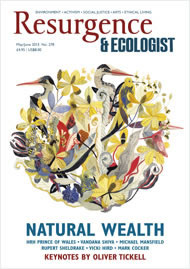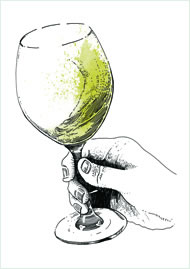Thus far the heroic Fiat 500 had endured the challenging meteorological conditions, but then there was a hill and down it slid, like a child’s sled when someone lets go of the string. Gliding to a gradual halt in a clearing, I got out of the car to complete my journey the old-fashioned way, on foot. From behind a fence a grey horse greeted me with such knowing eyes that I thought he was about to speak. It was cold and the snow crunched as I made my way up the hill in awe of the beauty of the place and the hush of early morning. Stately, ancient cypresses overlooked the black wintering vines.
Nicolas Joly is a world authority on biodynamic wines and winegrowing and is an outspoken critic of modern agriculture. Unsurprisingly, he is often characterised as a crackpot, yet his Coulée de Serrant is renowned as one of the great white wines of France. When he started running his family estate in 1976, Joly farmed conventionally and enjoyed country life. “When I was young I loved being in the forest close to Nature. It was a way of life. It is difficult to change your life.”
Raised a Catholic, Joly became a Buddhist and changed his life. Part of this process was discovering the writings of Rudolf Steiner, whose anthroposophic method of viticulture was expounded in a series of lectures at Koberwitz Castle in 1924. “I came across his book by chance. Biodynamic farming was not known at all then,” Joly explains. “I decided to try it as an experiment because I did not like what I saw happening in the vineyards.” When the local cooperative found out what he was doing, they came to tell his mother that he was destroying the estate.
Three decades later biodynamics is still controversial. Jamie Goode and Sam Harrop explain in Authentic Wine: Toward Natural and Sustainable Winemaking:
Most scientists just don’t get on with biodynamics. While some biodynamic practices make good sense and can be explained scientifically ... other elements ... are quite odd. For example, the biodynamic calendar has astrological elements to it, some of the preparations ... are rather strange, and the dynamization of the preparations by stirring them in certain ways seems a bit pointless. Also, the theoretical background to biodynamics was apparently received by Austrian polymath Rudolf Steiner while he was in a trance.
Indeed, it would be easy to dismiss biodynamics were it not for the fact that some of the world’s great wine estates are farmed biodynamically, and frequently their wines have improved since they began farming this way. When you look at the calibre of some of the wine estates employing biodynamics ... you’d have to be extremely stubborn not to take biodynamics seriously.
If biodynamics is gaining wider acceptance, this is not because an increasing number of wine producers and consumers are irrational. People are willing to pay a premium for fine wine – and at this moment in time there seems to be no limit to how high a premium at the top end of the market. In a sense, wine itself is irrational. Biodynamics provides an alternative to modern, technologically advanced wines designed to have international appeal; the focus is on authenticity as a benchmark of quality.
One widespread misconception is that to be biodynamic is a step up from organic in some sort of hierarchy, but actually it is an entirely different way of thinking. Biodynamics considers the health of the soil to be just one of a myriad of elements that must be considered in order to achieve balance with Nature, and the objective is to make a wine that reflects a specific vintage. This is why biodynamic producers object to the use of cultured yeasts (today almost universal) that alter natural aromas in wine and take away the element of risk that is a corollary to individuality. These aromatic yeasts – as well as other oenological tricks – are even allowed in wine that is labelled ‘organic wine’, according to the wine labelling laws of the EU, which were reformed in 2009.
“The criteria to be certified organic are, in my opinion, way too lax,” says Peter Hahn, the owner of Le Clos de la Meslerie near Vouvray, whose first vintage in 2008 was singled out by La Revue du Vin de France for its extraordinary purity and fullness of flavour, as well as that other most important and ineluctable quality, the sensitive, faithful and yet completely original expression of the specific place where it comes from… In other words, terroir. Hahn painstakingly tends his 3.5 hectares entirely by hand, producing a tiny yield of around 7,000 bottles. The fermentation with natural, wild yeasts, in old oak barrels, lasts for up to eight months. “You can do whatever you want with yeasts and still be called organic. You can use enzymes, you can use proteins. The level of sulphur I use is at least three times less than what is permissable to be organic.”
Hahn does not follow Steiner’s teachings, although his approach is similar to biodynamics in many respects. He does not use the special biodynamic herbal preparations fermented inside specific animal parts, or follow the lunar calendar.
For Joly, the biodynamic preparations make sense on an intuitive level: “A farmer doesn’t feel the need to explain something. He just knows it to be true. A scientist will cut it in a million pieces. People need to learn to think differently. If you do a scientific analysis of a tear, you can never tell if it comes from joy, or from sadness.” According to Joly, biodynamics is in no way whatsoever about following recipes and calendars. No one checks what biodynamic preparations are used by the members of La Renaissance des Appellations, an association of more than 190 winegrowers from around the world, which Joly started in 2001. “We take new members on the basis of knowing the person. Ten of us, all people of the land and farmers, have to agree that the product is authentic,” says Joly. “It has to be a true expression of its terroir.”
In The Agricultural Course published in London in 1938, Rudolph Steiner writes:
Instinct was at the root of all the work of man in this realm before there was a science of the subject. The old calendars with their versified rules of practice that one still finds among peasants are often surprisingly wise and expressive. And it is quite possible for a man with sure instincts to avoid superstition in these matters. For along with very profound sayings concerning the sowing and reaping of grain we get occasional sayings directed against extravagances, for example “If the cock crows on the dunghill it will either rain or keep fine.” Kräht der Hahn auf dem Mist, so regnet es, oder bleibt wie es ist. Instinctive wisdom is always sufficiently armed with a sense of humour to be on its guard against superstition.
And in that frame of mind at the end of our interview M. Joly dragged my little rented car out of the snow with a rope, which he did laughing the whole time and in the best of spirits.







